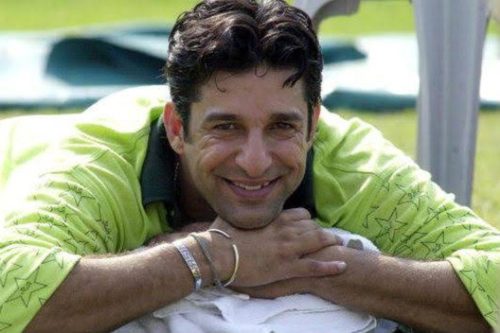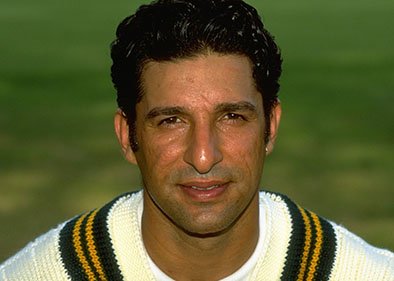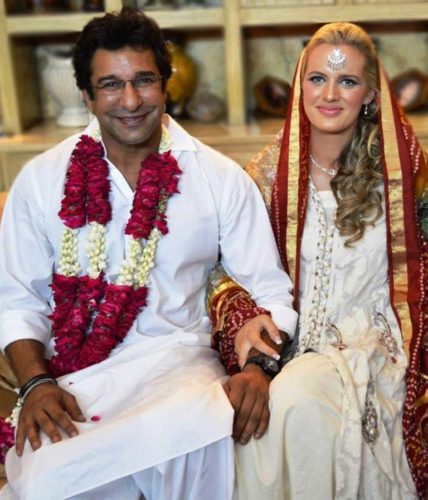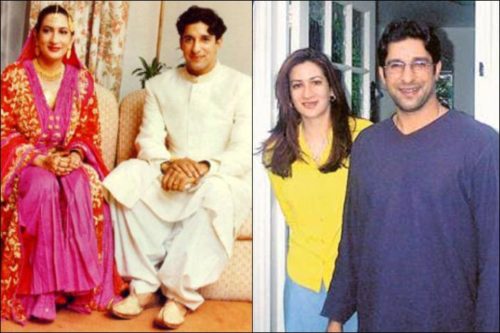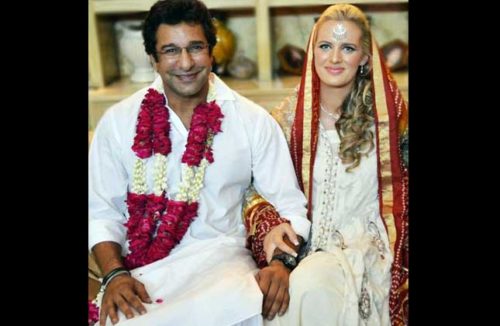Wasim Akram 10 Personal Facts, Biography, Wiki
Pakistani cricketer Born: June 3, 1966 (age 54 years), Lahore, Pakistan Test debut (cap 102): 25 January 1985 v New Zealand ODI debut (cap 53): 23 November 1984 v New Zealand Last ODI: 4 March 2003 v Zimbabwe Bowling: Left-arm fast Spouse: Shaniera Akram (m. 2013), Huma (m. 1995–2009) KNOWN FOR Cricket NICKNAME: Waiz and Sultan of Swing FULL NAME: Wasim Akram PROFESSION: Former Cricketer (Fast Bowler) and Coach NATIONALITY: Pakistani AGE: 54 years old (in 2020) DATE OF BIRTH: 3 June 1966 BIRTHPLACE: Lahore, Punjab, Pakistan ZODIAC SIGN: Gemini HEIGHT: 6’ 2” (1.88 m) WEIGHT: 85 kg (194 lbs) CHEST: 44 inch BICEPS: 13.5 inch HAIR COLOR: Black EYE COLOR: Dark Brown
Wasim Akram 10 Pics, Photos, Pictures
Wasim Akram 10 Fast Facts, Biography, Wiki
Wasim Akram is one of the legendary Cricketer of Pakistan Unfortunately, he went through diabetes at a young age Akram was spotted by Javed Miandad first later he debuted for Pakistan in a 1984-85 series On his first tour, he was unaware that he will get paid Akram won 17 successful awards of Man of the Match He is 17 years older than Shaniera (His Wife) Wasim Akram, popularly known as the Sultan of Swing, is a former Pakistani international cricketer. Born on 3 June 1966, he is regarded as one of the best bowlers to have graced the sport. Akram was a left-arm fast bowler by trade, but also anchored some vital victories for his team with the bat, down the order. Akram was the first bowler to take 500 ODI wickets and still holds the record for claiming the most ODI wickets as a seamer. Akram was an unknown club cricketer who took trails at Gaddafi Stadium had failed to make it even to his college team. He got his chance to bowl only on the third day of the trails but his performance convinced Javed Miandad to include him in the national team without any significant domestic experience. In 1984, he played for Pakistan Automobiles Corporation for 2 years before moving to the Lahore cricket team on three different phases of his career. He was in the squad during 1985–1986 Austral-Asia Cup where he played an important role in winning the trophy by defeating their arch rivals India in closely contested final. Akram made his international debut in the second ODI of the New Zealand tour of Pakistan on 23rd November 1984. He bowled 4 overs conceding 31 runs without claiming a wicket. Pakistan went on to win the match by 5 runs. His test debut came was on 25th January 1985 against the same rivals but as a visiting team this time. The 2nd test of the series saw New Zealand trashing Pakistan by an innings and 99 runs as Akram claimed 2 wickets and failed to score a run in both innings. In the 3rd and final test, he claimed 10 wickets but failed to carry his team through the finish line as they fell short by 2 wickets. After making his debut in 1984 under the captaincy of Zaheer Abbas, he rose to prominence by claiming five wickets in his 3rd ODI against Australia. In the 1987 Cricket World Cup, he managed only 7 wickets throughout, with an average of over 40 runs per wicket across all 7 matches. He managed figures of 4 for 25 against Australia in the 1988–89 Benson and Hedges World Series. In the 1989–1990 Champions Trophy, Akram took his hundredth wicket at Sharjah against West Indies and got a hat-trick for the second time in his career. During the 1992 Cricket World Cup held in Australia and New Zealand, Pakistan was playing at their best and so was Akram. They went on to win the tournament. Akram played a valuable knock of 33 of 18 balls and led the bowling attack by finishing with figures of 3/49, in the final. He has adjudged the player of the series and was the leading wicket-taker of the tournament (18). In 1993 against Sri Lanka, he took two consecutive 4-wicket hauls, where 7 out of 8 wickets were either LBW or bowled. He finished with 17 4-wicket hauls throughout his career with 22 Man of the match awards. In 1992, he was accused of ball tampering by the English media after the win against England. In April 1993, he made his maiden tour as Pakistan’s captain in the West Indies tour. But he along with three teammates were arrested for possession of marijuana. They were later released on bail. In 1999, he led Pakistan to the brink of another World Cup but were defeated by Australia in the final by eight wickets with Australia chasing the target in just 20.1 overs. There are still claims that Akram had set up the match for Australia. But none of the allegations were proved. In the 2003 Cricket World Cup, he took 12 wickets in 6 matches. However, Pakistan couldn’t qualify for next round, resulting in eight players including Akram to be sacked by the Pakistan Cricket Board. Akram played for Pakistan Automobiles Corporation between 1984 to 1986, which was first-class cricket side that played in the Patron’s Trophy, the Quaid-e-Azam Trophy and the Pentangular Trophy until 1993-94. He played for Lahore cricket teams in three different spells (1985–1987, 1997–1998, 2000–2001) and played County cricket for Lancashire between 1988–1998 before representing Hampshire County Cricket Club in 2003. Akram was awarded Wisden Cricketer of the Year in 1993 for his sporting achievements along with Nigel Briers, Martyn Moxon, Ian Salisbury and Alec Stewart. He is the first bowler in international cricket and to take more than 400 wickets in both ODI and Tests. Akram is the only bowler to have achieved four hat-tricks in international cricket, with two each in Tests and One Day Internationals. Akram scored an unbeaten 257 runs from 363 balls against Zimbabwe which is the highest score by a number eight batsman in tests. He has won 17 Man of the Match awards in Test cricket which is the joint-third highest number of awards. He holds the record for taking the most number of wickets in ODI at a single ground at Sharjah with 122 wickets. He played his last test match against Bangladesh on Jan 9-11 2002 at Dhaka. He bowled only 2.4 overs before walking out with an injury which turned out to be his last game in the format. After a disappointing campaign in the 2003 World Cup, he was one of the 8 players to be sacked by the Pakistan board which resulted in him not being able to contest in his farewell match. He, however, fulfilled his contract for Hampshire until the end of the English season.
Frequent searches leading to this page

